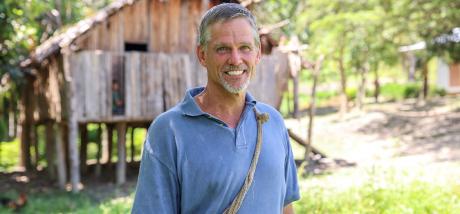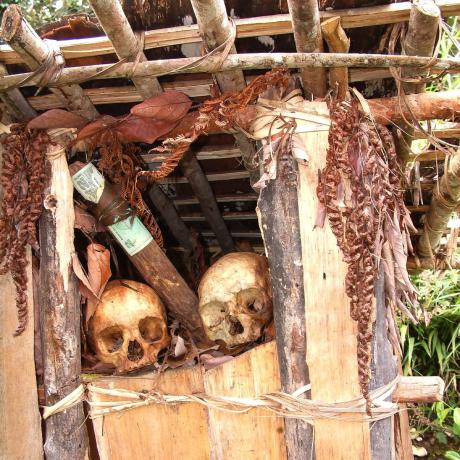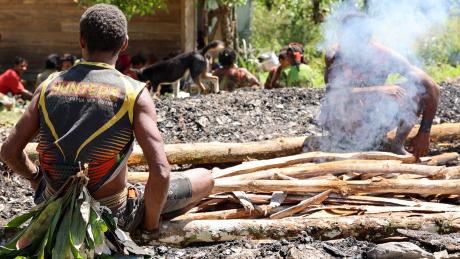
The Hewas - God’s story, God’s people, God’s future. Part 4
Missionaries often get accused of trying to change people’s culture and traditions for the sake of religion. But for the Hewa, they wanted missionaries to come live with them and they invited the Kopf family to move into their village to teach them about God. And so, in this final part of our series, Jonathan Kopf explains how when the Hewa learned how to live under God’s leadership they became loving and compassionate husbands and fathers as they turned their backs on their ancestral customs of killing people, and they became confident in the strength of their Saviour instead of living in fear of spirits.
As Jonathan and his Hewa friends trust in God for the concerns of their future, they are confident He will be there to guide them.
My heart grieved for the ancestral belief system they were caught up in, and from then on, I felt a new level of heightened urgency to translate the New Testament and teach God’s view of the origin of sickness and death, and the solution that Jesus offers.
Today, we can thank the Lord that through the power of His Word these young men that you see here in this village who have grown to adulthood, these young men who now have wives and children of their own have never killed even one person their entire life. That’s the exciting power of the Word of God. And we feel very privileged to have been able to witness the transformation.
Every Man a Murderer
How the Hewa people of the Yifki village lived when we first arrived and how they are living now is tremendously different. We credit God for how he has been changing their hearts. But it has been a long journey, a slow process—this kind of ministry can’t be accomplished on a summer missionary trip.
When we first arrived and started studying the Hewa culture and language, we soon realized they were an aggressive kind of people who killed others regularly. They mostly went on raids to kill Hewa people of different villages, but sometimes killed even inside their own villages. They had many enemies. They targeted others with violence and they also were targeted by violence. As we were investigating into their practice of killing we found that actually every young man had taken part in murder raids—at that time in my inquiries, I never found an exception.
It was that every young man who had matured enough to have a beard was expected to participate in these murder raids.
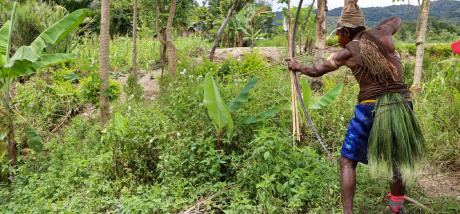
Trapped by the Spirits
As we were looking into this, we realised, that our friends, the people, we had been living with and had come to know and love were actually caught in a system where they believed that all sickness and all death were a result of evil spirits. The Hewas had a huge range of beliefs in different spirits, some who they considered benevolent and helpful, and some who they thought were out to get them. They had been taught that these kinds of spirits could eat out their insides to cause them to get sick and die of regular illnesses such as malaria and pneumonia, or even by various accidents.
Their whole belief system was based on their supposed relationship with several different levels of spirits. They thought that the most hideous spirits, the spirits that were the strongest, the ones that had the ability to eat people to cause them to get sick and die, were spirits that lived inside of women and children. And then, in order to discover which person had a spirit living in them they would say something like, ‘I saw it in a dream,’ or, ‘I heard the last words of a dying person,’ and based on the dream or last words they would make accusations saying, ‘That woman over in the next village has an evil spirit, and all her children also have evil spirits.’
And so, to save lives, to keep people from getting sick and dying, they believed the only solution was to go and kill these women and children who they assumed had evil spirits that were causing the sickness and death.
While I was investigating this belief system, I learned of many current accusations and also of the counter-accusations, which meant several murder raids were being planned and were imminent.
That’s the scenario we found when we arrived in Hewa in 2000; the opposite of the serene, peaceful and stress-free kind of life that some people speak of when referring to remote villages of the jungle. Back then, not only did I discover that several women and children were being targeted, but I also learned that some men were planning to exterminate an entire village of people who lived about a day hike from our village.
My heart grieved for the ancestral belief system they were caught up in, and from then on, I felt a new level of heightened urgency to translate the New Testament and teach God’s view of the origin of sickness and death, and the solution that Jesus offers.
The Power of God’s Word
Of course, we as outsiders do not have the authority to say, ‘Hey, stop! Stop killing women and children!’ We don’t have the power to change their culture. We really believe the power is in the Word of God as we translate the Bible into their language. We know that as we teach them the message of the Bible, it is the power of God’s Word that can impact their way of thinking. As they began to understand what their Creator had said, and the system He had set in place, that’s when their worldview started to change. That’s when they started to break away from their ancestral beliefs about the origin of sickness and death.
According to the Creator God, sickness and death do not come because evil spirits are inside of women and children, and the solution Jesus demonstrated was not to go and kill them. As we introduced our Hewa friends to Jesus, and as we presented His message, we saw changes come into their lives, and we saw them respond to His way of thinking.
In the first village we lived in, there were only a few who responded. It may have been fewer than ten. At that time, I wasn’t even sure if there were more than five that comprehended the meaning of God’s story. But we could see that there were a few who understood who their Creator was and who they were as His children because of how Jesus paid for their debt of sin.
Later, after we moved to this new village and again told an overview story of the Bible, the response has been incredibly different. That’s when the village patriarch—the witch doctor—and his son, who was his protégé, caught the significance of the story. They then spoke on behalf of the village, saying, ‘This is who we are. We are now the Jesus people and we are going to follow His trail. We are going to teach our kids how Jesus has paid for our debt for sins and how to live under His authority.’
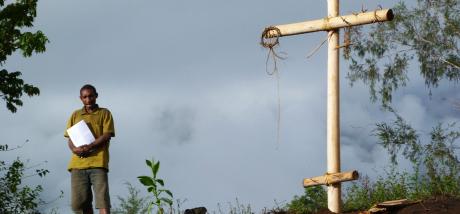
Making Disciples
The initial response was immediate and dramatic, but big changes take time. They don’t happen overnight. And that has given us a deeper understanding of how Jesus called us to be disciples and to work to cause others to be disciples. He said, ‘Go and make disciples.’ He didn’t say, ‘Go and construct a church building.’ He didn’t say, ‘Go and start a school.’ He didn’t say, ‘Go and start a medical clinic.’ Those are all good and valid ways to demonstrate the love of Jesus, but our primary task is to help them become disciples of Jesus.
When Jesus said, ‘Go and make disciples,’ it meant we would need to leave the comfort of our own setting to go live in the villages of other people. It requires that we get to know them, to discover their basic beliefs. And then we need to help explain the truth of what Jesus taught. And that is what we are trying to do.
We have seen dramatic changes since the time we first arrived and began studying the Hewa language and culture in 2000. Back then, we could not find even one young man who hadn’t killed somebody, who hadn’t participated in a murder raid. Now we can thank the Lord that through the power of His Word these young men that you see here in this village who have grown to adulthood, these young men who now have wives and children of their own have never killed even one person their entire life. That’s the exciting power of the Word of God. And we feel very privileged to have been able to witness the transformation.
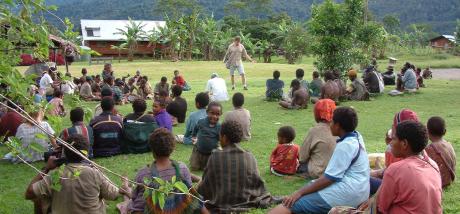
Animistic Beliefs and Adding God into the Mix
One of the biggest challenges we have encountered over the years could be referred to as a default setting that came from ancestral teachings. This animistic worldview belief system causes people to automatically think that God is in the same category as the various spirits that their ancestors taught them about, who they felt they could manipulate and appease in order to receive physical and material benefits.
As I’ve described, the Hewa believed in different levels of spirits, and they spent their lives trying to appease the various spirits. They were taught by their witch doctors that if they could succeed in harmonizing all the spirits, to make them all happy, then their physical lives would be perfect—then their gardens would grow well with no droughts or pests, and pigs would no longer be able to break through their fences to destroy the gardens. They were told that if they could harmonize all the spirits just right with their all-night spirit dances and with their paintings of spirits on bark or wood, then the benevolent and helpful spirits would make sure that they always had game in their traps and cause them to always be successful when hunting. They believed that success in the physical world came from balancing and harmonizing the spiritual world through rituals. That was their animistic focus in life.
So, when we first started teaching them stories about God, their default setting led them to assume, ‘Oh, if we listen to stories about the God of these foreigners and we harmonize Him together with our other spirits, then we will automatically get all the material goods that the foreigners have. Like they have a shirt. I want a shirt. How do I get a shirt? I need to go to their church and sit through their teaching, and then their God will give me free shirts or pants or shoes, axes, machetes, cooking pots, and possibly even a metal roofed house. When we understood this miss-perception, we realized we needed to help them understand that the Creator God is not in the same category as the other spirits that their ancestors told them about.
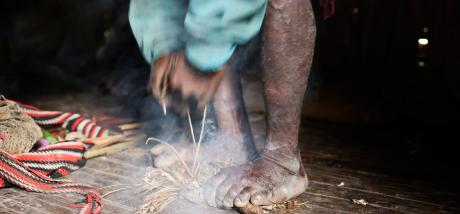
Dependence on the Lord
When we learned their culture and language well enough to begin teaching, we realized it was important to start at the beginning of the Bible with God’s story of creation. It was important to show that God is the creator of everything that we see—He is the creator of all human beings, of animals, of every plant, all the food that they eat, the firewood that they gather, the trees, poles, and vines that they use to build their houses, of everything that they’re dependent on—it all originates with God. And because He made everything, He is the rightful owner of everything. And because He is our owner, He has the authority to tell us what to do, and we have a responsibility to respond to His leadership.
It’s not that we can appease and manipulate God, so we can gain a better physical life. It is that he sets the rules—He says what to do, and we need to listen to Him. And because we don’t always obey Him, we need to accept his offer to pay for the debt that resulted from our sins. We don’t sit through a teaching session so that He will somehow become obligated to give us a better physical life, but because He is our Creator, we need to respond to what He asks of us.
When people listen to this new line of reasoning from the Bible, it is the Holy Spirit who reaches into their hearts and gives them the ability to embrace truth, and that’s when their way of thinking begins to change. When they start seeing this, it radically changes them from the inside out. Then they can start treating their wives and children with the love that Jesus demonstrated. That’s when they can help their children develop a different way of living based on compassion and caring for the needs of others. That’s when they can put away bullying and lies and deceit to get ahead and start serving others through the love Jesus demonstrated. This Biblical worldview changes their animistic reasoning. But this kind of change happens only as they get taught the entire story from the very beginning, so they get a comprehensive picture of who God is—by teaching the foundation of God is their Creator. Because He made us He owns us, and so we have a responsibility to listen to Him.
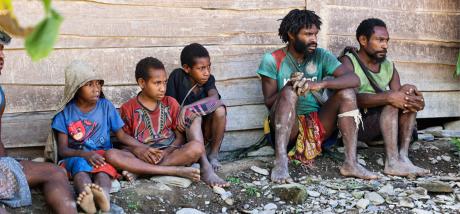
Trusting God for the Hewa’s Future
Their future is a mystery to me. Only God knows what’s going to happen over the next years. But we are trying to do our very best to set a solid foundation of trust in God and in His written Word. We know that as they read and study it their faith will continue to develop and deepen. We can’t live here in the jungle forever, and we can’t set up a system that will take care of them forever. As they develop trust in their Creator and call out to Him, He will take care of them and their future generations.
We’re teaching them dependence on God alone. I can’t be their Saviour, neither now nor later. They must look completely to God to help them with their daily survival. We have seen that their dependence on God is growing so that they are now looking to the Lord instead of to us foreigners. And so, I have confidence that they’ll be fine in the future as they continue to follow their Creator.
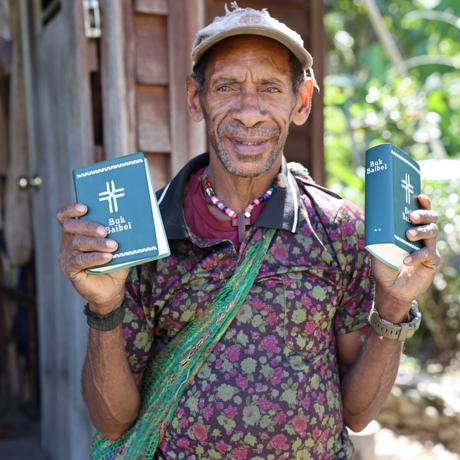
Are you interested in finding out more about the Hewas' journey with God because the Kopf family and other missionaries followed Jesus' command and went to live in the jungle with the Hewas, to preach the gospel, baptised and continue to make disciples?
In this four-part story, Jonathan takes us along with his family on the adventure of reaching the Hewas with the message of God’s love, so murderers became loving fathers, but also shares how God too provided for their basic medical and educational needs.
Read Part 1 of their story HERE, titled "A village that's following Jesus."
Part 2 focuses on the people's plea for education. Read it HERE.
Part 3 focuses on the people's need for medical help and how God also provided in that area. Read it HERE.

